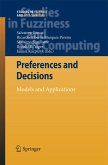Decision making is all around us. Everyone makes choices everyday, from the moment we open our eyes in the morning. Some of them do not have very important consequences in our life. However, in the business world, managers make decisions that have a great impact on the future of their own company. Furthermore, when several competing agents are involved in a decision making situation and the combination of their actions affects each other's revenues, the problem becomes more complicated. When we are aware of someone observing and reacting to our behavior, one might occasionally prefer a sub-optimal choice aimed at causing confusion on the adversary, so that it will be more difficult for him to guess our decision in future encounters, which may report us a larger benefit. The objective of this book is the analysis and design of adversarial decision and optimization-based models which are able to represent adversarial situations. We are going to conduct theoretical studies and propose practical applications including imitation games and patrolling domains.
Bitte wählen Sie Ihr Anliegen aus.
Rechnungen
Retourenschein anfordern
Bestellstatus
Storno








